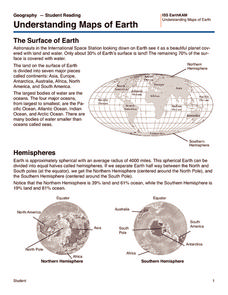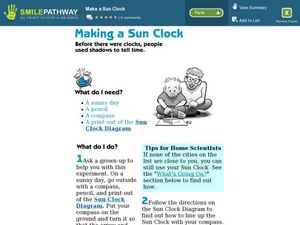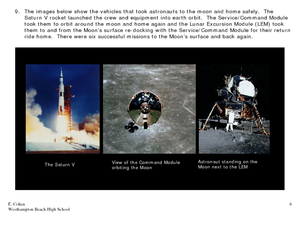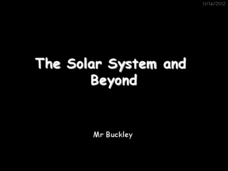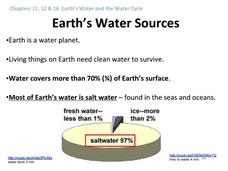Curated OER
Attract or Repel?
Opposites attract with a fun science experiment on magnets. With a short paragraph on background knowledge, the lab sheet prompts third and fourth graders to choose which pairs of magnets will attract, and which pairs will repel. A...
Curated OER
What Causes Day and Night?
Why do we have four seasons? A series of questions about the Earth's orbit and its impact on seasons challenge Earth science students.The second page of the resource has nine multiple choice questions, such as "One year on Earth is one...
Institute for Geophysics
Understanding Maps of Earth
Here is your go-to student resource on primary geography concepts, including facts about the surface of the earth and its hemispheres, latitude and longitude, globes, types of maps, and identifying continents and oceans.
K12 Reader
World Climates
Why is weather different around the world? Learn about world climates with a reading comprehension passage. Kids read a short passage before answering five comprehension questions based on context clues.
Dorling Kindersley
Punctuation Practice
Need some punctuation practice? Challenge your third or fourth graders' editing skills with a helpful instructional activity on punctuation. After naming different types of punctuation marks, they rewrite a paragraph that has multiple...
Curated OER
Geography Terms
Introduce the terms and concepts related to basic map and geography skills. Terms include full definitions and cover latitude, longitude, the Equator, Tropic of Cancer, Tropic of Capricorn, Prime Meridian, and the International Date Line.
California Academy of Science
Tropical Belt
Where in the world is the equator? Explore a world map with your class, coloring in oceans, continents, and rainforests while locating the three major lines of latitude: the equator, Tropic of Cancer, and Tropic of Capricorn. Discuss how...
It's About Time
Where are the Volcanoes?
Middle school geologists map the volcanoes closest to themselves, learn about map distortion, and infer possible future volcano locations. A focus on latitude, longitude, and volcanoes beneath the ocean helps connect the lesson.
Curated OER
Magnetism
A wonderfully rich presentation teaches about magnets and magnetism. Each slide is packed with interesting information on the discovery, history, physics, and uses for magnets. Good photographs, and an emphasis on vocabulary are part of...
K12 Reader
Where On Earth Are You?
What do we use to determine the exact locations on the earth? Your kids can learn all about compass roses and latitude and longitude. Test understanding with the five reading comprehension questions included on the page.
Curated OER
Latitude/Longitude Activity
Youngsters work in groups to solve clues involving latitude and longitude coordinates in order to decipher mystery animals in this fun learning experience!
Curated OER
Making a Sun Clock
In this clock construction lesson, students use a pencil, compass, and sun clock diagram to construct a homemade sun clock. A very interesting lesson on combining images with text.
Curated OER
Oreo Moon Phases.
A guide to recreating all the phases of the moon out of Oreo cookies with varying amounts of cream filling. Although a simple activity, there are more involved questions requiring moon cycle and phase comprehension and leading...
CPO Science
Science Worksheets
If you need an array of worksheets to augment your science lessons, peruse a collection of assignments that is sure to fit your needs. With topics such as metric conversion, the scientific method, textbook features, research skills,...
Concord Consortium
The Six Faces of Amzora
Here's a task that is out of this world! Given a description of a fictional cube-shaped planet, scholars answer a set of questions about the planet. They create a two-dimensional map and consider the distances between locations on the map.
Curated OER
Modeling the Seasons
Junior geologists become the force that makes the world go around! With a lamp on the floor in the middle of the room to represent the sun, volunteers hold a globe, revolve, and rotate. Observers notice how the light hitting the globe...
Curated OER
The Solar System and Beyond
What an inspiring PowerPoint! The color scheme and pictures all contribute to the scientific style of this PowerPoint and will keep the attention of your junior high kids. The diagrams help illustrate the positioning of the moon, sun and...
Curated OER
The Solar System and Beyond
Survey the solar system by viewing this PowerPoint. Amateur astronomers discover that gravity is responsible for Earth's orbit around the sun and the moon's orbit around Earth. They explore the moon's phases and Earth's seasons. This...
K12 Reader
Location, Location, Location
Why do some places in the world have more people living there than other places? Learn about the ways the countries have formed around natural resources with a reading comprehension activity. After kids read a short...
Curated OER
Tilted Earth
What causes Earth's seasons? Find out through a series of anticipatory questions, an easy yet powerful activity representing the sun-Earth system, a diagram to label, and follow-up questions. Dispel the misconceptions about Earth being...
Curated OER
The Oceans, Waves, Tides & Currents
Your introductory lesson to oceanography can be outlined with this apropos presentation. It touches on the physical features of the ocean floor, waves, tides, and currents. One small issue is that some of the graphics are not of the...
Curated OER
Earth's Water Sources
General facts about Earth's water sources, human use, and the water cycle are outlined by this presentation. Slide three has a grammatical error and slide nine refers to the local watershed of the author, so you will need to make a few...
It's About Time
AC and DC Currents
An informative physics lesson includes two teacher demonstrations, one on AC currents and the other on DC currents, allowing pupils to take notes while watching. The resource includes questions to assign as homework or...
National Wildlife Federation
Why All the Wiggling on the Way Up? CO2 in the Atmosphere
The climate change debate, in the political arena, is currently a hot topic! Learners explore carbon dioxide levels in our atmosphere and what this means for the future in the 11th installment of 12. Through an analysis of carbon dioxide...
Other popular searches
- North Pole Animals
- Magnetic North Pole
- The North Pole
- Science North Pole
- North Pole and Santa
- Google Earth North Pole
- North Pole Lessons
- Expeditions North Pole
- Artic North Pole
- Attic North Pole
- Exploration of the North Pole
- Preschool North Pole




